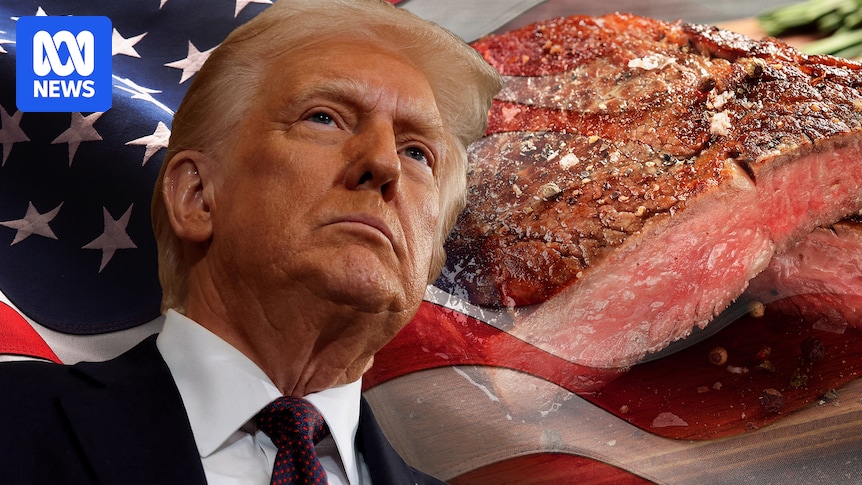
United States President Donald Trump has announced plans to impose a 50 percent tariff on all imports from Brazil, a move that could significantly impact the global beef market. This decision comes amidst Trump’s accusations that Brazil has engaged in “insidious attacks on free elections” and his criticism of the treatment of former President Jair Bolsonaro as a “witch-hunt” and an “international disgrace.”
The tariffs are set to take effect on August 1, potentially disrupting Brazil’s role as the leading supplier of beef to the United States. Trump has offered a reprieve, stating that the tariffs would not apply if Brazil or its companies choose to manufacture products within the United States.
Impact on Brazil and the Global Beef Market
Brazil, under the leadership of President Luiz Inacio Lula da Silva, is a significant trading partner for the US. The proposed 50 percent tariff would elevate Brazil’s import tax on beef to 76.4 percent, factoring in the existing 26.4 percent duty that applies once exports exceed 65,000 tonnes—a quota reached earlier this year.
“In May this year, Brazil exported a record amount of beef into the US despite the 26.4 percent tariff, plus Trump’s 10 percent [Liberation day tariff],” said Brett Stuart, a US-based Global AgriTrends meat analyst. “But at 76 percent, that is just untenable, that’s unworkable.”
Stuart warned that Brazilian beef exports to the US could come to a halt if a resolution is not found by the August deadline. This scenario would likely benefit Australian beef producers, who could see a surge in demand from American importers.
Opportunities for Australian Beef Producers
Australia stands to gain from the potential void left by Brazilian beef. Stuart predicts a sharp increase in demand for Australian and New Zealand beef if Brazil exits the US market. “The phones are going to be ringing if this happens,” he noted.
The US cattle herd is currently at its lowest level since the 1950s due to drought conditions, leading to record-high beef prices and increased reliance on imports. Stuart highlighted that the price of lean beef in America is currently at a discount compared to imported Australian products, a situation that could change rapidly if Brazilian beef is no longer available.
“I don’t think we’ll see a big shift in bids for Australian beef next week, but if that August 1 deadline passes and Trump says it’s on, that could change quickly,” Stuart added.
Record Australian Beef Exports
Australia is already experiencing a record year in beef processing and exports. According to Meat and Livestock Australia (MLA), the country exported 134,593 tonnes of beef last month alone, contributing to a year-to-date total of 702,218 tonnes—up 17 percent from the previous year.
The United States has been the largest customer for Australian beef this year, importing 203,072 tonnes, a 31 percent increase from last year. China follows closely, with imports up by 39 percent. With China not renewing export licenses for about 300 US abattoirs, it has turned to Australian beef, and may soon increase orders of Brazilian beef if Brazil loses the US market.
“If Brazil loses the US market, Chinese importers are going to be getting a deal on Brazilian beef,” Stuart said.
Implications for US Consumers and the Broader Economy
The US imported $42.3 billion worth of Brazilian goods in 2024, and the new tariffs could have far-reaching effects on food prices, particularly for beef and coffee. Reuters reports that a third of the coffee consumed in the US comes from Brazil, and a tariff of this magnitude could severely disrupt this supply.
“A tariff of that size would all but shut down that flow. Brazil will sell its coffee elsewhere,” Reuters noted.
More than half of the orange juice sold in the US is also sourced from Brazil, adding to the potential impact on American consumers. With US beef prices already at record highs, Stuart emphasized that a tax on Brazilian beef would exacerbate the situation.
“The irony here is that one of the major meat packers in America is Brazilian-owned (JBS) and it could make the argument [to Trump] that it’s already invested heavily in America,” Stuart remarked.
As the August 1 deadline approaches, the global beef market is poised for potential shifts. Stakeholders across the industry are watching closely to see if Brazil can negotiate a deal to avoid the tariffs, or if Australian beef producers will seize the opportunity to expand their presence in the US market.






